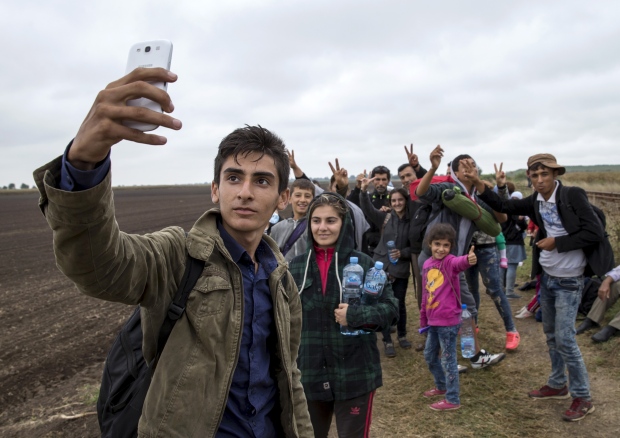
End Date : April 10, 6:45 pm
Conference Panels: Heyman Center for the Humanities, Common Room
Keynote: Jerome Green Annex
The Society of Fellows and Heyman Center for the Humanities
Columbia University English Department & Comparative Literature
IRWGS (The Institute for Research on Women, Gender, and Sexuality)
NYU Media, Culture, & Communication
The Institute for Comparative Literature and Society
The image of Syrian refugees with a smartphone shooting ‘selfies’ upon reaching dry land has captured the international imagination (Chouliaraki, 2017; Kunstman, 2017; Risam, forthcoming 2018). It suggests an image of the ‘connected migrant’ (Diminescu, 2008), which is shaped by a profound ambivalence: migrants are expected to be people fleeing from war, violence, and poverty; they are not expected to be ‘digital natives’, equipped with technologies to navigate their difficult journeys. While smartphones are accessible, affordable, and easy to use, in the realm of the public imaginary the image of the disenfranchised and disconnected migrant remains that of the ‘have nots’, and therefore subject to ‘high tech orientalism’ (Chun, 2006, p. 73). This posits the figuration of the migrant as outside the realm of development and modern forms of communication, disenfranchised and vulnerable in order to be worthy of international aid and pity (Boltanski, 20000; Ticktin, 2008). And yet smartphones are ubiquitous, and migrants have been early adopters and heavy users of technologies for the simple reason that these technologies are ingrained in their daily practices and everyday lives, which often involve perilous crossings but also the need to keep in touch with the home front and their diasporic communities. The promise of connectivity that is guaranteed even under duress becomes fraught with the profound disconnection brought about by the disciplining gaze of Western media and publics (Risam, 2017).
It is, therefore, crucial to focus on the specific way in which digital technologies bridge or magnify the gap in migration between geographical distance and digital proximity. How are affect, intimacy, and belonging negotiated online in the face of forced migration and expulsions (Sassen, 2012) but also of circular migration, expatriation, and transnational movements? Due to the increased feminization of migration the gendered analysis is particularly urgent. How do these new technologies help overcome isolation and segregation fostering networks of support and integration for migrant women? How do these networks stretch across different diasporas and how are new forms of transnational citizenship articulated?
This conference aims to cover a broad range of conflict-related issues on migration in a digital age. Using the latest insights from a range of interdisciplinary fields, it will explore theories of displacement such as diaspora, cosmopolitanism, and nomadism, and the transformations brought about by the digital revolution, through the analysis of virtual communities, social media platforms, and digital activism. It will also focus on media production and the regulation of information on forced migrants in a ‘post-truth’ era: fake news; the humanitarianism-securitization nexus, migration management, social and political conflicts related to migrant and diaspora communities, radicalization and online counter-terrorism, hate speech and racism, but also solidarities, activism, and protest.
Keynotes:
Prof. Arjun Appadurai (NYU): “Narrative Panic and the Edges of Europe”
Prof. Mirca Madianou (Goldsmiths): “Technocolonialism: Digital Innovation and Data in Humanitarian Practice”
Organizer: Prof. Sandra Ponzanesi (Columbia U)
Contact: Sp3630@columbia.edu
Cost Free. For Full Program and Registration: click here
DAY 1 – Tuesday, April 10: Heyman Center, Common Room
9.00-9.30: Coffee
9.30-10.00: Opening
- Sarah Cole (Dean of Arts and Sciences, Division of Humanities)
Introduction
Sandra Ponzanesi (Utrecht University/Columbia University)
10.00-11.30, Panel I: Digital Cartographies ‘in’ Time
Moderator: Radhika Gajjala (Bowling Green State University)
Alex Gil (Columbia University): ‘ “In The Same Boats”: Moving Maps and Cartographies of Intersections’
Roopika Risam (Salem State University) : “Cartographies of the Living and the Dead: Mapping Global Migration”
Anne McNevin (The New School): “Time, Digital Media, and the Figure of the Migrant”
11.30 am-13.00, Panel II: Networks, Affects and Activism
Moderator: Jonathan Corpus Ong (University of Massachusetts, Amherst)
Claudia Minchilli (Utrecht University): “Somali Women in Postcolonial Italy: Identity Construction Through Digital Connectedness”
Donya Alinejad (Utrecht University): “Social Media and Feelings of Presence: Mobile Apps and Emotions in a Context of Transnational and Urban Mobility.”
Radhika Gajjala (Bowling Green State University): ‘Migration and Mobility in Gendered Indian Digital Social Media Spaces: Revisiting “Ghar and Bahir” ‘
Break: 13.00-14.00
14.00-15.30,Panel III: Digital Migration in Europe
Moderator: Radha Hegde (New York University)
Melis Mevsimler (Utrecht University): “Divided Nation, Divided Diaspora: Crossroads of Gender and Homeland Politics in Everyday Lives of Migrant Women from Turkey in London”
Myria Georgiou (London School of Economics/Annenberg School of Communication, USC) : “The Communication Architecture of Humanitarian Securitization: Communicative Politics of Reception at Europe’s Borderland.”
Koen Leurs (Utrecht University): “Connected Migrants and Digital Migration Studies in Europe”
15.30-15.45: Coffee Break
15.45-17.15, Panel IV: Cosmopolitan Interruptions
Moderator: Sandra Ponzanesi (Utrecht University/Columbia University)
Bruce Robbins (Columbia University): “The Refugee and the Beneficiary”
Frances Negrón-Muntaner (Columbia University): “The Emptying Island: Puerto Rican Expulsion in Post-Maria Time”
Wouter Omen (Utrecht University): “Humanitarian Communication, Common Humanities Playground”
17.30 -18.45: Keynote
Mirca Madianou (Goldsmith, University of London): “Technocolonialism: Digital Innovation and Data in Humanitarian Practice”
Chair: Sandra Ponzanesi







